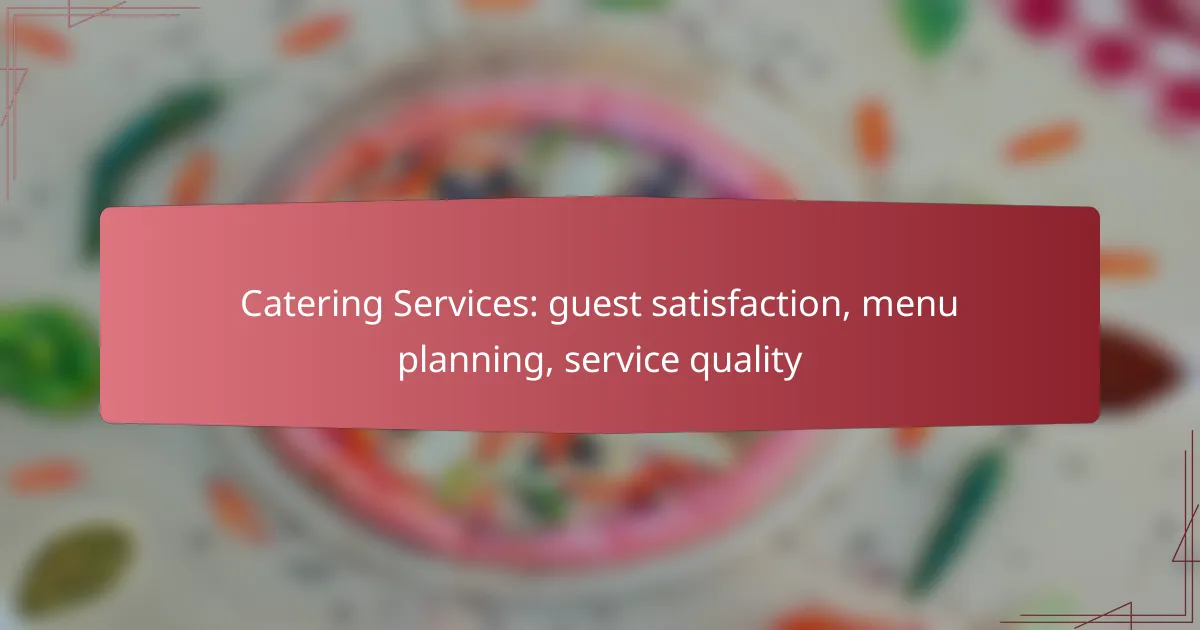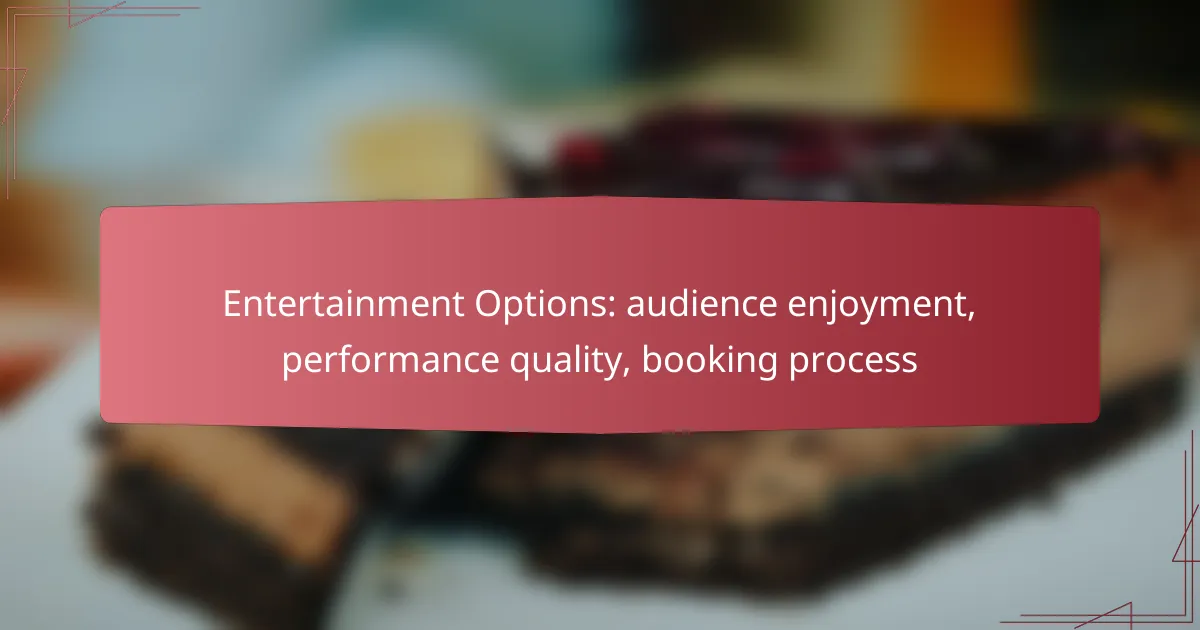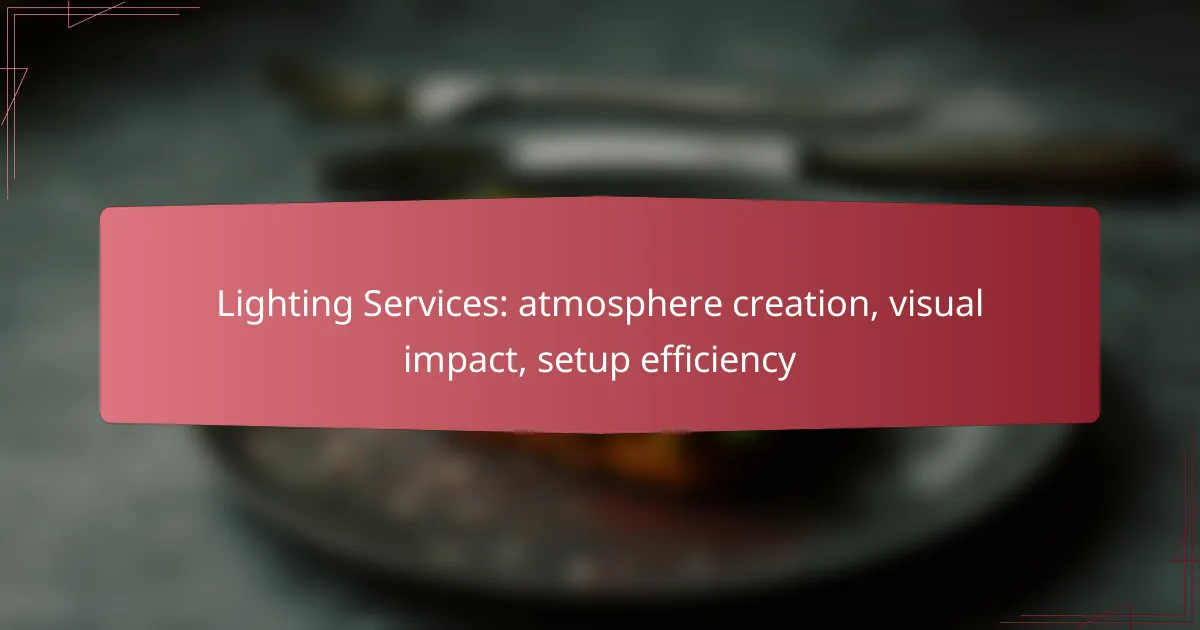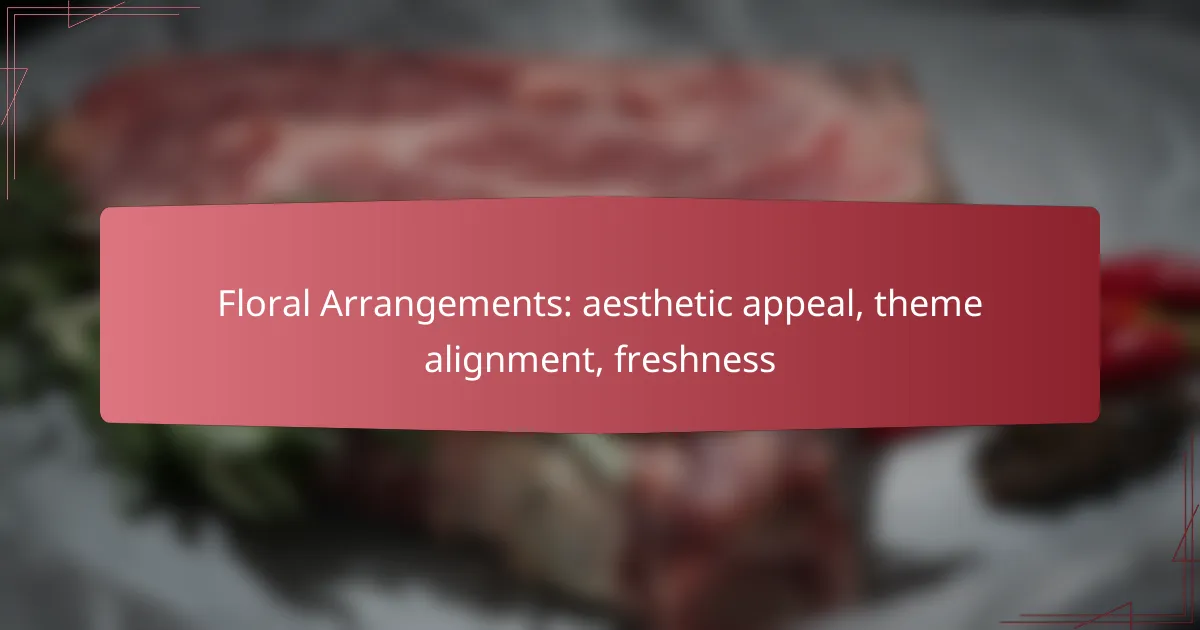Catering services play a vital role in enhancing guest satisfaction through personalized experiences and high-quality food presentation. Effective menu planning, which includes fresh ingredients and consideration of dietary needs, further elevates the dining experience. Additionally, exceptional service quality is essential, as it directly impacts how guests perceive their overall event, fostering loyalty and positive word-of-mouth.

How can catering services improve guest satisfaction in London?
Catering services in London can enhance guest satisfaction by focusing on personalized experiences, responsive service, and high-quality food presentation. These elements contribute significantly to the overall dining experience, ensuring that guests feel valued and catered to.
Personalized menu options
Offering personalized menu options allows catering services to cater to diverse dietary preferences and restrictions. This can include vegetarian, vegan, gluten-free, or allergen-free choices, which are increasingly important in today’s dining landscape.
When planning a menu, consider conducting a pre-event survey to gather guests’ preferences. This approach not only enhances satisfaction but also demonstrates attentiveness to individual needs.
Responsive customer service
Responsive customer service is crucial for addressing any concerns or requests from guests promptly. Catering teams should be trained to handle inquiries and issues efficiently, ensuring that guests feel heard and valued throughout the event.
Implementing a clear communication channel, such as a dedicated event manager, can streamline interactions and enhance the overall experience. Quick responses can significantly boost guest satisfaction, especially in a bustling city like London.
Quality of food presentation
The quality of food presentation plays a vital role in guest satisfaction. Visually appealing dishes not only entice guests but also elevate the overall dining experience. Attention to detail in plating and serving can make a significant difference.
Consider using elegant serving dishes and garnishes to enhance visual appeal. A well-presented meal can leave a lasting impression and encourage positive feedback from guests.
Timely service delivery
Timely service delivery ensures that food is served at the right temperature and freshness, which is essential for guest satisfaction. Delays can lead to dissatisfaction, so effective timing is crucial.
Establishing a clear timeline for food preparation and service can help avoid delays. Regular communication with the kitchen staff and event coordinators can ensure that everything runs smoothly, keeping guests happy and engaged.

What are the best menu planning strategies for catering?
The best menu planning strategies for catering focus on using fresh ingredients, accommodating diverse dietary needs, and understanding guest preferences. These strategies enhance guest satisfaction and ensure a successful catering experience.
Seasonal ingredient sourcing
Seasonal ingredient sourcing involves selecting fresh produce and proteins that are currently in season. This not only improves flavor and quality but also supports local farmers and reduces costs. For example, using summer vegetables like zucchini and tomatoes can elevate a dish while keeping expenses manageable.
When planning a menu, consider the local growing seasons and availability of ingredients. This approach can lead to creative dishes that resonate with guests and reflect the region’s culinary identity.
Diverse dietary options
Offering diverse dietary options is crucial in catering to a wide range of guests. This includes vegetarian, vegan, gluten-free, and allergen-friendly choices. By providing these options, you ensure that all guests feel included and satisfied with their meal.
When planning your menu, aim for a balance of flavors and textures across different dietary categories. For instance, a hearty quinoa salad can serve as a filling vegan option while also appealing to non-vegans.
Guest preference surveys
Guest preference surveys are an effective way to gather insights on what your attendees want. Sending out a simple questionnaire before the event can help identify popular dishes and dietary restrictions, allowing for a more tailored menu.
Consider including questions about favorite cuisines, specific dislikes, and any dietary restrictions. This feedback can guide your menu planning and increase overall satisfaction, leading to a more successful catering event.
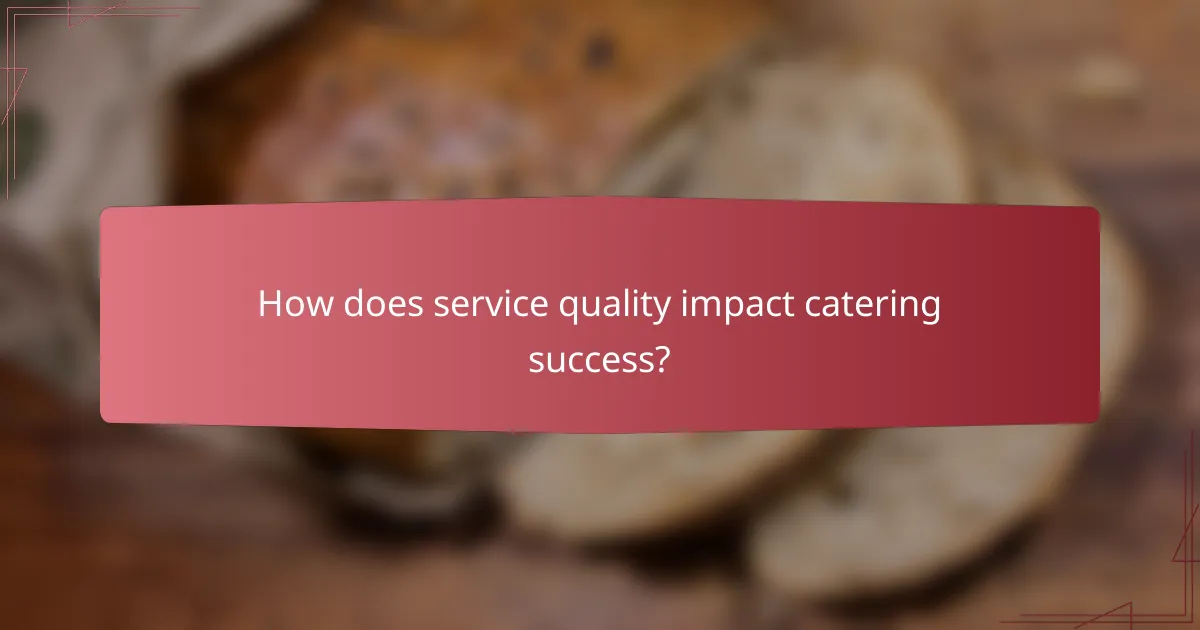
How does service quality impact catering success?
Service quality is crucial for catering success as it directly influences guest satisfaction and overall event experience. High service quality ensures that clients receive the attention and care they expect, leading to repeat business and positive referrals.
Staff training programs
Effective staff training programs are essential for enhancing service quality in catering. Training should cover customer service skills, food safety practices, and event-specific protocols to ensure staff are well-prepared to meet client expectations.
Regular workshops and role-playing scenarios can help staff practice handling various situations, from managing dietary restrictions to addressing guest complaints. Investing in training can lead to improved employee confidence and performance.
Service consistency
Consistency in service delivery is vital for maintaining high standards in catering. Clients expect the same level of quality and attention at every event, regardless of size or location. This can be achieved through standardized procedures and checklists for staff to follow.
To ensure consistency, consider implementing a quality control system that includes regular evaluations and feedback loops. This helps identify areas for improvement and reinforces best practices across all events.
Client feedback integration
Integrating client feedback is a powerful way to enhance service quality in catering. Actively seeking input after events allows caterers to understand client perceptions and identify strengths and weaknesses in their service.
Establishing a simple feedback mechanism, such as surveys or follow-up calls, can provide valuable insights. Use this information to make informed adjustments to menus, service styles, and overall client interactions, ensuring continuous improvement and client satisfaction.
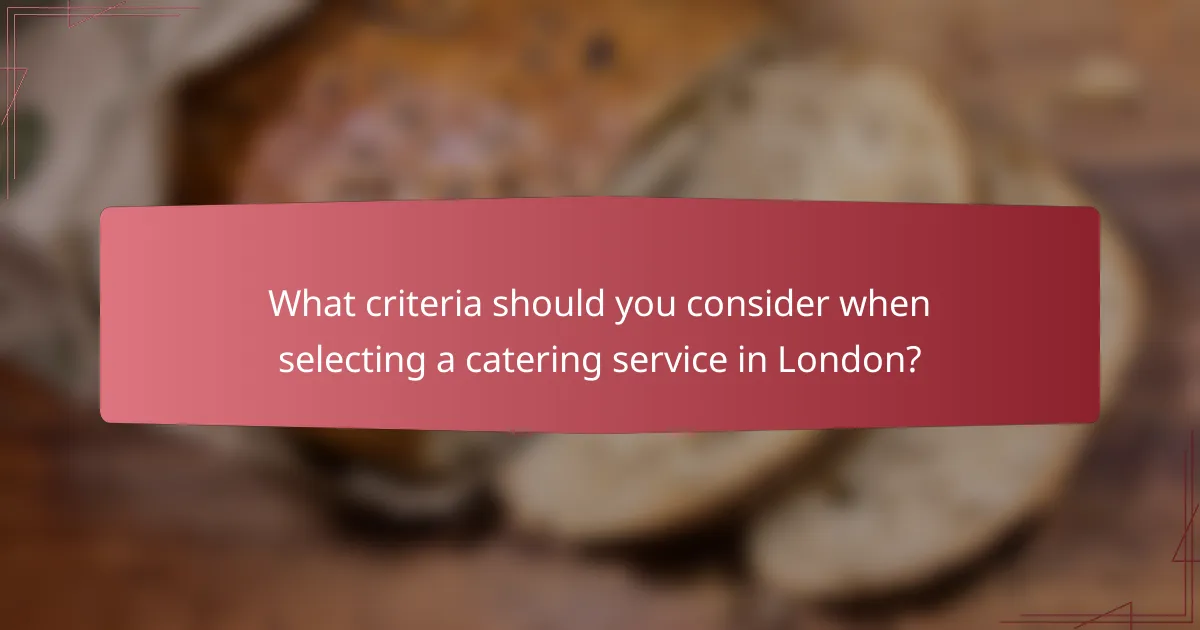
What criteria should you consider when selecting a catering service in London?
When selecting a catering service in London, prioritize reputation, menu flexibility, and pricing transparency. These factors significantly influence guest satisfaction and overall event success.
Reputation and reviews
Reputation is crucial when choosing a catering service. Look for companies with positive reviews on platforms like Google, Yelp, or local forums. A strong reputation often indicates reliable service and quality food.
Consider asking for references or testimonials from previous clients. This can provide insight into the caterer’s reliability, professionalism, and ability to meet specific needs.
Menu flexibility
Menu flexibility allows you to tailor offerings to your event’s theme and dietary requirements. A good caterer should accommodate various preferences, including vegetarian, vegan, and gluten-free options.
Discuss potential menu adjustments during your initial consultation. This ensures the caterer can meet your expectations and adapt to any last-minute changes.
Pricing transparency
Pricing transparency is essential to avoid unexpected costs. Ensure the caterer provides a detailed breakdown of their fees, including food, service, and any additional charges.
Ask about payment terms and cancellation policies upfront. Understanding these aspects can help you budget effectively and prevent surprises as your event date approaches.

What are the pricing models for catering services?
Catering services typically utilize several pricing models to accommodate different client needs and event types. Understanding these models can help you choose the best option for your budget and requirements.
Per-person pricing
Per-person pricing is a common model where the total cost is calculated based on the number of guests attending the event. This model usually includes food, beverages, and sometimes service fees, making it straightforward for clients to estimate their overall expenses.
Prices can vary significantly depending on the menu choices, ranging from budget-friendly options to gourmet selections. For example, a basic meal might cost around $15 to $30 per person, while upscale catering could range from $50 to $150 or more per person.
Package deals
Package deals offer a set menu and services for a fixed price, making them an attractive option for clients seeking simplicity. These packages often include appetizers, main courses, desserts, and beverages, tailored for specific events like weddings or corporate functions.
Packages can provide cost savings compared to a la carte pricing, as they are designed to cater to common needs. For instance, a wedding package might start at $1,500 for 50 guests, while corporate packages could range from $1,000 to $3,000 depending on the level of service and menu complexity.
Custom quotes
Custom quotes are tailored to meet the specific requirements of an event, taking into account the client’s preferences, guest count, and unique needs. This model allows for flexibility in menu selection, service style, and additional services like rentals or staffing.
When requesting a custom quote, be prepared to provide details about your event, including the type of cuisine desired and any dietary restrictions. This model can lead to a wide range of pricing, often starting from a few hundred dollars for small gatherings to several thousand for larger, more elaborate events.
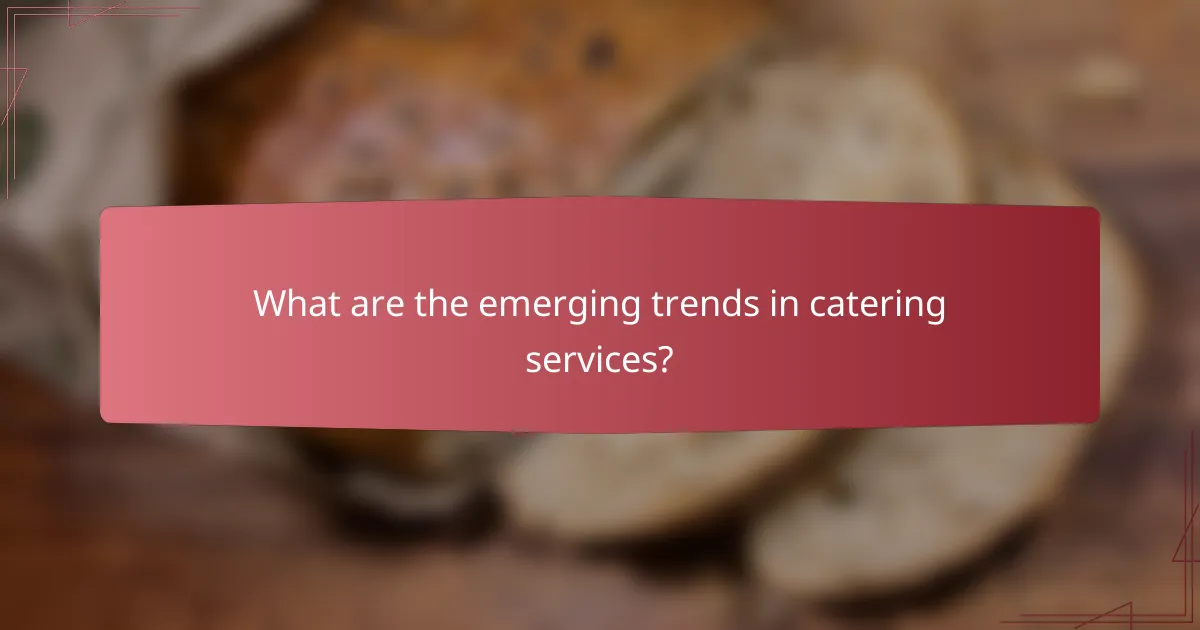
What are the emerging trends in catering services?
Emerging trends in catering services focus on sustainability, personalization, and technology integration. These trends aim to enhance guest satisfaction while adapting to changing consumer preferences and environmental considerations.
Guest satisfaction
Guest satisfaction in catering is increasingly driven by personalized experiences and quality service. Caterers are now focusing on understanding individual preferences, dietary restrictions, and cultural backgrounds to create tailored menus that resonate with guests.
To enhance satisfaction, caterers should actively seek feedback and adapt their offerings accordingly. Implementing surveys or informal check-ins during events can provide valuable insights into guest experiences and areas for improvement.
Menu planning
Menu planning is evolving to include diverse and health-conscious options, reflecting current dietary trends such as plant-based diets and gluten-free choices. Caterers are encouraged to offer a variety of dishes that cater to different tastes and nutritional needs.
When planning menus, consider seasonal ingredients to ensure freshness and sustainability. Additionally, providing customizable options can allow guests to create their own plates, enhancing their dining experience.
Service quality
Service quality remains a critical factor in catering, with a strong emphasis on professionalism and responsiveness. Training staff to deliver exceptional service can significantly impact guest perceptions and overall satisfaction.
Caterers should invest in staff training programs that focus on communication skills, problem-solving, and attention to detail. Regular evaluations and feedback sessions can help maintain high service standards and address any issues promptly.
